From the terrorist attack that was… broadcast live
Ecuador’s national police chief, César Zapata, said officers had regained control of the TC Television station in the coastal city of Guayaquil, arresting 13 people and seizing weapons, including grenades, by Tuesday afternoon. Zapata said the attackers appeared to be members of Los Tiguerones, a drug gang that emerged from Esmeraldas province on the border with Colombia.
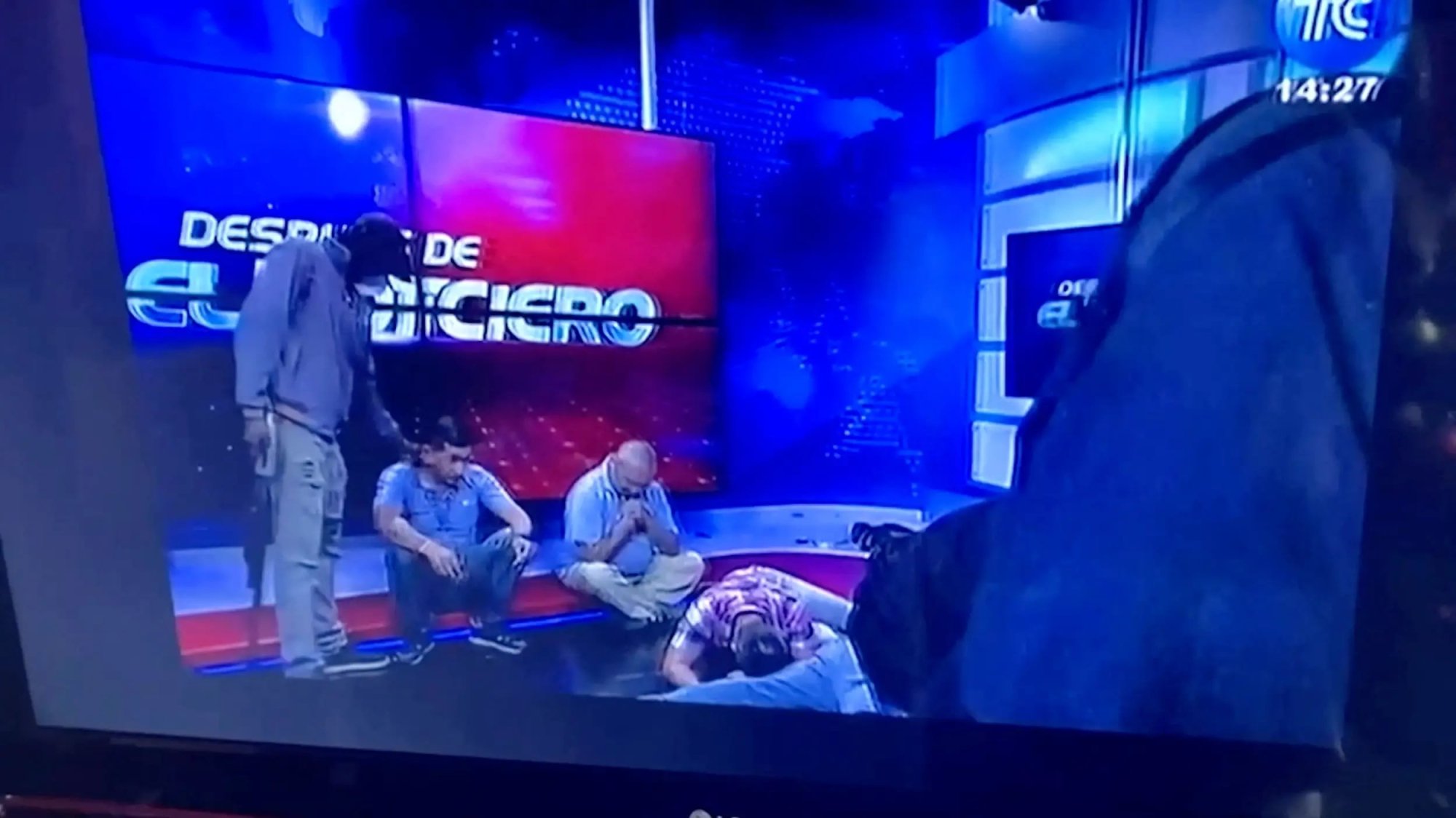
Screenshot of masked men pointing guns at the heads of employees of Ecuador's TC TV station on Tuesday (January 9) - Photo: CNN
During the live attack that lasted 15 minutes, masked terrorists brandishing submachine guns kicked the station staff who were cowering on the floor. Then people screamed as what sounded like gunshots were heard in the background.
“Tell the audience we have a bomb,” one of the terrorists shouted to the TV staff, holding what appeared to be a grenade. Another gunman held what appeared to be a stick of dynamite in front of the TV cameras.
“Don’t shoot!” a woman can be heard shouting in a video shared on social media. In another video, terrified station staff begged the country’s new president to order police to leave as gunmen pointed their weapons at them.
The TV signal was then cut off. The raid by special police, as Mr. César Zapata said, rescued the hostages and arrested 13 criminals. According to information from TC TV, fortunately no one was killed and only 2 TV staff were injured.
TC TV has returned to normal. But out on the streets, on the notoriously dangerous streets of the port city of Guayaquil, the violence has not subsided. As gangs respond, at least eight people have died and two others have been injured in violence in Guayaquil as of Tuesday afternoon (January 9), according to Mayor Aquiles Álvarez, who held a press conference with the police chief.
To the scene of widespread violence
The violence was not limited to Guayaquil. Explosions, car fires, looting and gun battles were reported across Ecuador. People were panicking and afraid. Shops, schools, government offices and buildings were closed. Workers were laid off and the streets of Quito and Guayaquil were clogged with traffic as people tried to get home quickly and avoid death.
After Ecuadorian authorities announced on Sunday that Adolfo Macias, aka Fito, leader of the country's second-largest gang, Los Choneros, had escaped from a prison where he was serving a 34-year sentence, violence broke out in at least six other prisons in Ecuador, with at least 150 guards and other staff taken hostage by inmates.
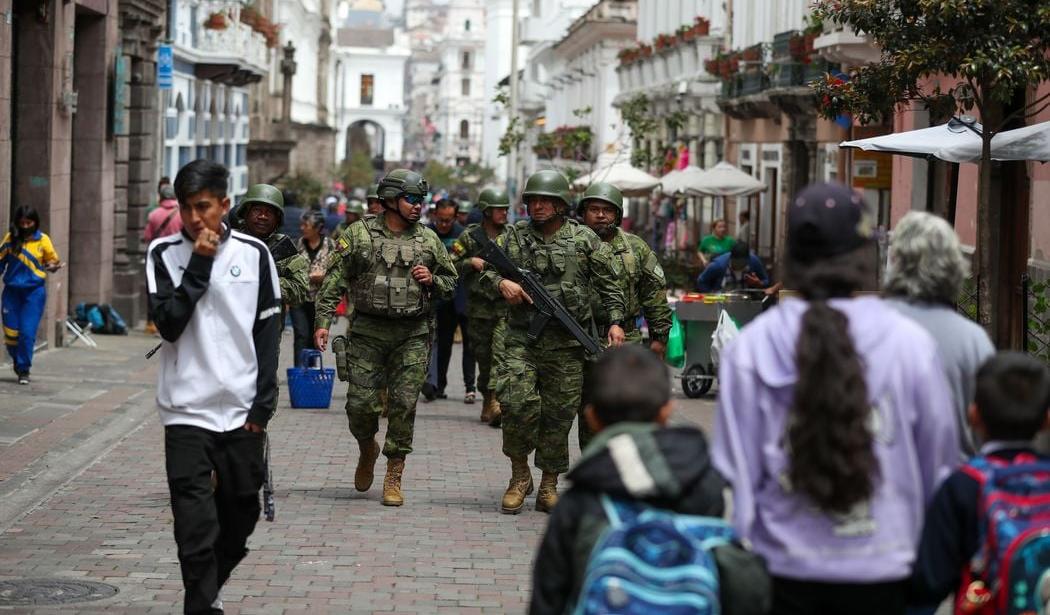
By Tuesday, violence had spilled onto the streets, with seven police officers kidnapped in gang attacks across the country and five explosions confirmed in several cities, but no injuries were reported.
In the capital Quito, an explosion occurred outside the home of the Supreme Court president, while explosions occurred in the Andean city of Cuenca. In the city of Guayaquil, videos posted on social media showed university students hiding in classrooms as gang members opened fire on campus.
“Talk or war,” one gangster says in the video. “We will start killing police, prison guards and civil servants.” Another video shared by gang members on Tuesday via WhatsApp shows dozens of prison guards kneeling on the floor with hooded men pointing knives and guns at them.
Another gang member declared war on the authorities. “You have turned the prison into a battlefield,” the hooded gunman shouted. “You have started a bloody war.”
Why is security in Ecuador so terrible?
In the face of violence, Ecuador's new President, Daniel Noboa, on Tuesday declared the country in armed conflict and ordered police and the army to "neutralize" two dozen mafia gangs that he described as "terrorist organizations."
Mr. Noboa's announcement also means that the Ecuadorian government will extend the nationwide curfew to 60 days and allow the army to patrol the streets and control prisons.
The Ecuadorian government said that nationwide violent deaths rose to 8,008 in 2023, nearly double the more than 4,500 in 2022. According to Spain's El Pais newspaper, as of October last year, gang violence in Ecuador had resulted in 6,348 homicides, a rate of 34.8 per 100,000 inhabitants, the third highest in Latin America.
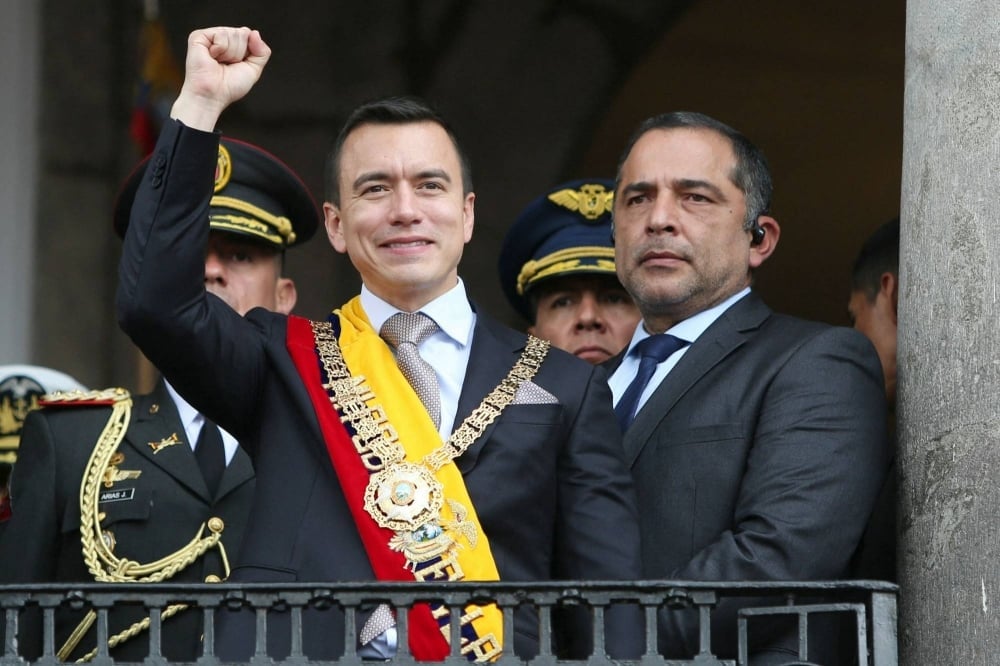
Ecuador's new President Daniel Noboa is determined to restore order to the country - Photo: GI
It’s not just ordinary people who are being victimized. Last year’s Ecuadorian presidential election was marred by the assassination in August of the anti-corruption, hard-line crime candidate, Fernando Villavicencio. And wealthy businessmen aren’t safe either. They were the target of nearly 200 kidnappings for ransom in Ecuador in the first half of 2023 alone.
Security in Ecuador has deteriorated, turning the once peaceful country into one of the most feared in Latin America. The Ecuadorian government blames the situation on the growing expansion of cocaine trafficking gangs, which have joined forces with notorious Mexican and Colombian cartels to act as “logistics” for the drug trade from South America to North America and Europe. Ecuador’s seaports, especially Guayaquil, have thus become an ever-bustling gateway for cocaine shipments.
The lucrative business is shared by more than 20 criminal gangs across Ecuador, armed as much as the police and very brutal. Where there is business, there is competition. These gangs, in addition to dominating the locality, also seek to expand their territory and often cause shootouts and assassinations among themselves.
Once in prison, criminals create their own world and rules. They take advantage of poor management and the corruption of many guards to control the prison. Violence in prisons is increasingly common, with hundreds of people killed in gang wars.
President Noboa, after taking office in November, launched a program called “Phoenix Plan” to strengthen security control, including a new intelligence unit, more weapons for the police, building new, higher-security prisons and increased security at seaports and airports.
According to observers, weapons and prisons are only half the battle. People are the decisive factor in the rampant violence in Ecuador, and that is the key that needs to be solved.
Mr. Noboa himself understands this well. The 36-year-old President is launching a strong crackdown to clean up the government apparatus. The latest and most notable is the arrest of 29 suspects, including the President of the Ecuadorian Judicial Council, Mr. Wilman Teran, along with many prison administrators, lawyers, police officers and judges on December 15 on suspicion of participating in a drug trafficking ring.
Ecuador’s Justice Minister, Diana Salazar, has called the operation the first step in an effort to eradicate so-called “narco-politics” in Ecuador. And the government’s determination has been met with violent, brutal responses from gangs, such as the attack on the Chinese television station on Tuesday.
Nguyen Khanh
Source


![[Photo] Many streets in Hanoi were flooded due to the effects of storm Bualoi](https://vphoto.vietnam.vn/thumb/1200x675/vietnam/resource/IMAGE/2025/9/29/18b658aa0fa2495c927ade4bbe0096df)
![[Photo] General Secretary To Lam receives US Ambassador to Vietnam Marc Knapper](https://vphoto.vietnam.vn/thumb/1200x675/vietnam/resource/IMAGE/2025/9/29/c8fd0761aa184da7814aee57d87c49b3)


![[Photo] National Assembly Chairman Tran Thanh Man chairs the 8th Conference of full-time National Assembly deputies](https://vphoto.vietnam.vn/thumb/1200x675/vietnam/resource/IMAGE/2025/9/29/2c21459bc38d44ffaacd679ab9a0477c)
![[Photo] General Secretary To Lam attends the ceremony to celebrate the 80th anniversary of the post and telecommunications sector and the 66th anniversary of the science and technology sector.](https://vphoto.vietnam.vn/thumb/1200x675/vietnam/resource/IMAGE/2025/9/29/8e86b39b8fe44121a2b14a031f4cef46)
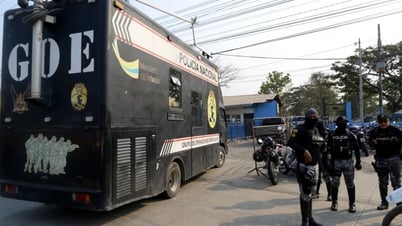
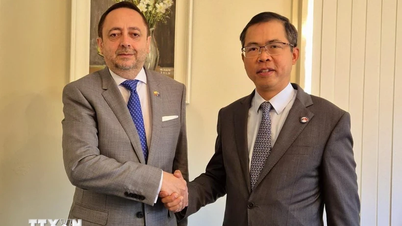

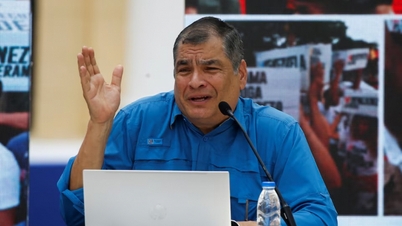























































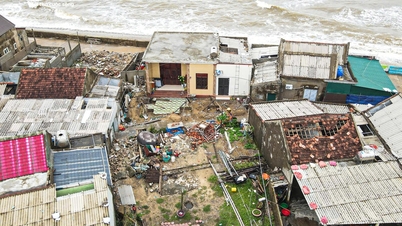



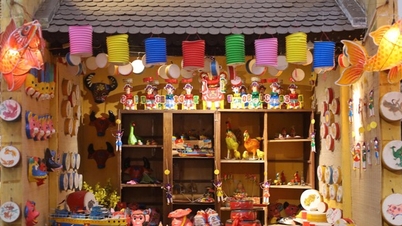








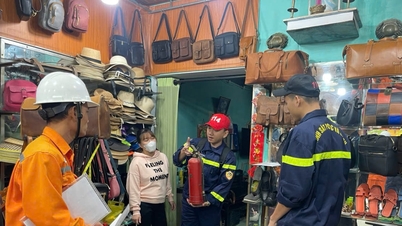

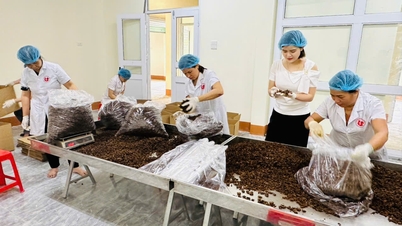

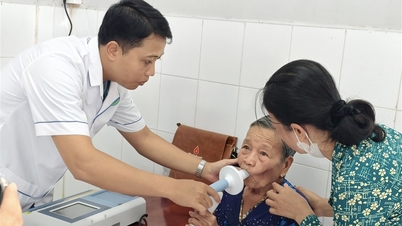




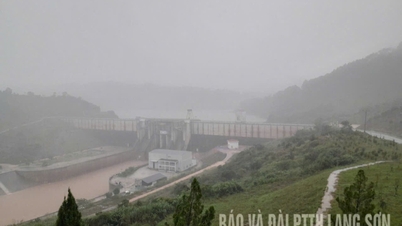












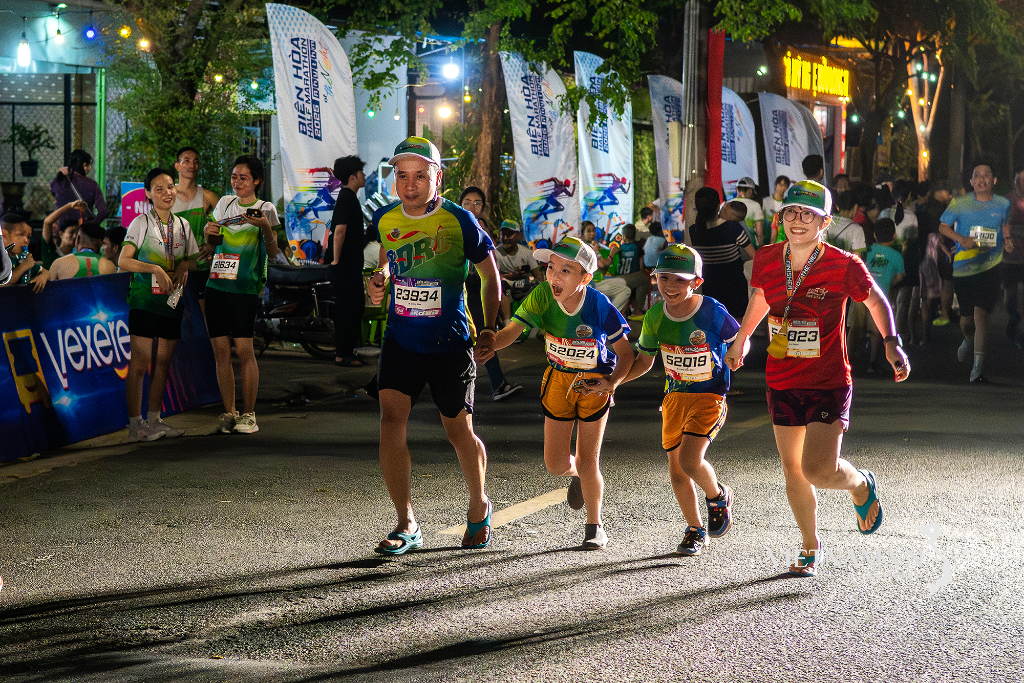

Comment (0)